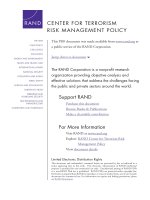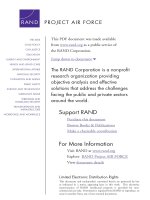Confronting Evil in International Relations pot
Bạn đang xem bản rút gọn của tài liệu. Xem và tải ngay bản đầy đủ của tài liệu tại đây (1010.36 KB, 240 trang )
Confronting Evil in
International Relations
pal-jeff-00fm.indd ipal-jeff-00fm.indd i 3/28/08 10:46:23 AM3/28/08 10:46:23 AM
Previous Publications
Hugo Grotius in International Thought (New York: Palgrave Macmillan,
2005).
Evil and International Relations: Human Suffering in an Age of Terror (New
York: Palgrave Macmillan, 2007).
pal-jeff-00fm.indd iipal-jeff-00fm.indd ii 3/28/08 10:46:25 AM3/28/08 10:46:25 AM
Confronting Evil in
International Relations
Ethical Responses to Problems of Moral Agency
Edited by Renée Jeffery
pal-jeff-00fm.indd iiipal-jeff-00fm.indd iii 3/28/08 10:46:25 AM3/28/08 10:46:25 AM
confronting evil in international relations
Copyright © Renée Jeffery, 2008.
All rights reserved.
First published in 2008 by
PALGRAVE MACMILLAN
TM
175 Fifth Avenue, New York, N.Y. 10010 and
Houndmills, Basingstoke, Hampshire, England RG21 6XS.
Companies and representatives throughout the world.
PALGRAVE MACMILLAN is the global academic imprint of the Palgrave
Macmillan division of St. Martin’s Press, LLC and of Palgrave Macmillan Ltd.
Macmillan
®
is a registered trademark in the United States, United Kingdom
and other countries. Palgrave is a registered trademark in the European
Union and other countries.
ISBN-13: 978-0-230-60263-2
ISBN-10: 0-230-60263-0
Library of Congress Cataloging-in-Publication Data is available from the
Library of Congress.
Edited by Renée Jeffery
Confronting evil in international relations : ethical responses to problems of
moral agency
p. cm.
Includes bibliographical references and index.
ISBN 0-230-60263-0
1. International relations—Moral and ethical aspects. I. Jeffery, Renée.
JZ1306.C67 2008
172’.4—dc22 2007045688
A catalogue record of the book is available from the British Library.
Design by Scribe Inc.
First edition: June 2008
10 9 8 7 6 5 4 3 2 1
Printed in the United States of America.
pal-jeff-00fm.indd ivpal-jeff-00fm.indd iv 3/28/08 10:46:25 AM3/28/08 10:46:25 AM
Contents
Acknowledgments vii
Notes on Contributors ix
Part 1 The Problem of Evil in International Relations
Introduction: Evil, Responsibility, and Response 3
Renée Jeffery
1 Evil and the Problem of Responsibility 11
Renée Jeffery
Part 2 Agency and Responsibility for Evil in International
Relations
2 Individual Agency and Responsibility for Atrocity 37
Kirsten Ainley
3 Collective Evildoing 61
Arne Johan Vetlesen
Part 3 Ethical Responses to Evil in International Relations
4 Evil, Agency, and Punishment 89
Anthony F. Lang, Jr.
5 Reconciliation: An Ethic for Responding to Evil in 115
Global Politics
Daniel Philpott
6 Avenging Evil: A Reconsideration 151
Ian Hall
7 To Forgive the Unforgivable? Evil and the Ethics of 179
Forgiveness in International Relations
Renée Jeffery
pal-jeff-00fm.indd vpal-jeff-00fm.indd v 3/28/08 10:46:25 AM3/28/08 10:46:25 AM
vi
●
Contents
Select Bibliography 213
Index 223
pal-jeff-00fm.indd vipal-jeff-00fm.indd vi 3/28/08 10:46:25 AM3/28/08 10:46:25 AM
Acknowledgments
Questions of “evil,” its meaning and manifestations in international poli-
tics, and the ethical challenges posed by its occurrence, have directed much
of my research in recent years. While many, perhaps even most, people
have questioned my sanity in taking on such a difficult, contentious, and
in many ways unsavory subject, a number of valued colleagues from near
and far have, nonetheless, sought to engage, on an intellectual and critical
level, my ideas about evil as they have developed. In particular, I have ben-
efited from conversations about this and other related subjects, as well as
the support and collegiality of Kirsten Ainley, Judith Brett, Chris Brown,
Ian Hall, and Tony Lang. During the initial stages of planning this collec-
tion of essays I was employed as a lecturer at La Trobe University in Mel-
bourne. I am extremely grateful for the support and encouragement I
received from a number of my colleagues there, including Gwenda Tavan,
Tom Weber, Judith Brett, and Dennis Altmann. The latter stages of writ-
ing, editing, and compiling this book took place at the University of Ade-
laide, where I took up a lectureship in the School of History and Politics in
2007. I would also like to acknowledge the contribution of Toby Wahl at
Palgrave Macmillan for his assistance in getting this project off the ground
in the first place.
However, the people that deserve the greatest thanks for seeing this
work to fruition are, of course, the contributors. This work brings together
the insights and expertise of a diverse range of scholars: from the fields
of International Relations and philosophy, and hailing from the United
Kingdom, Australia, the United States, and Norway, their areas of
interest include international ethics, international law, moral philosophy,
psychology, international relations theory, conflict resolution, the history
of international political thought, and religion in international affairs.
Each has made an invaluable contribution to the book, bringing their own
pal-jeff-00fm.indd viipal-jeff-00fm.indd vii 3/28/08 10:46:26 AM3/28/08 10:46:26 AM
viii
●
Acknowledgments
specialisations and perspectives to what is a subject fraught with contention
and controversy. I would like to thank each of them for their dedication
to this project over the past two years and for their cooperation and
professionalism in the final stages of putting the work together. On a
personal note, I would also like to thank Ian for his unfailing support,
encouragement, and intellectual engagement, both at home and at work.
pal-jeff-00fm.indd viiipal-jeff-00fm.indd viii 3/28/08 10:46:26 AM3/28/08 10:46:26 AM
Notes on the Contributors
Kirsten Ainley is a Lecturer in International Relations at the London School
of Economics and Politics. She completed a PhD thesis on “Rethinking
Agency & Responsibility In Contemporary International Political Theory”
in 2006 and is the author of “Responsibility for Atrocity: Individual Crimi-
nal Agency and the International Criminal Court,” in Evil, Law and the State:
Perspectives on State Power and Violence, ed. John Parry (Amsterdam: Rodopi,
2006), “The Social Practice of Institutional Responsibility,” in Responding to
“Delinquent” Institutions: Blaming, Punishing, and Rehabilitating Collective
Moral Agents in International Relations, ed. Toni Erskine (Basingstoke, UK:
Palgrave Macmillan, 2008); and, with Chris Brown, Understanding Interna-
tional Relations, 3rd Edition (Basingstoke, UK: Palgrave Macmillan, 2005).
Her current research includes work on the politics of international law in
general, and of war crimes trials in particular.
Ian Hall is a Senior Lecturer in International Politics in the School of History
and Politics, University of Adelaide. He is the author of The International
Thought of Martin Wight (New York: Palgrave, 2006) and several articles on
international theory and the history of international political thought. He
is currently working on a collaborative project on international ethics and a
book on utopianism and international theory.
Renée Jeffery is a Lecturer in International Politics at the Univer-
sity of Adelaide. She is the author of Evil and International Relations:
Human Suffering in an Age of Terror (New York: Palgrave Macmillan,
2008); Hugo Grotius in International Thought (New York: Palgrave Mac-
millan, 2006); along with a number of articles published in International
Affairs, Millennium: Journal of International Studies, The European Jour-
nal of International Relations, The SAIS Review of International Affairs,
and Conversations in Religion and Theology. Her current research includes
work on the international dimensions of forgiveness, and a co-authored study
of the intellectual history of international ethics.
pal-jeff-00fm.indd ixpal-jeff-00fm.indd ix 3/28/08 10:46:26 AM3/28/08 10:46:26 AM
x
●
Notes on the Contributors
Anthony F. Lang, Jr. is a Senior Lecturer in the School of International Rela-
tions at the University of St. Andrews. His work explores questions of inter-
national political theory, with particular attention to questions of violence
and ethics at the global level. He has published or edited books, articles, and
chapters on inter alia, humanitarian intervention, economic sanctions, coer-
cive diplomacy, responsibility, agency, Hannah Arendt, and Hans Morgen-
thau. His current work focuses on punishment in the international system
and the role(s) of rules and constitutionalism at the global level.
Daniel Philpott is an Associate Professor in the Department of Political
Science and the Joan B. Kroc Institute for International Peace Studies at
the University of Notre Dame. He is author of Revolutions in Sovereignty:
How Ideas Shaped Modern International Relations (Princeton, NJ: Princeton
University Press, 2001) and editor of The Politics of Past Evil: Religion,
Reconciliation, and Transitional Justice (Notre Dame, IN: University of Notre
Dame Press, 2006). He has also published articles on religion and interna-
tional affairs, the ethics of self-determination, reconciliation, and religious
freedom as an issue of human rights. He pursues an activist dimension of
his interests by working for faith-based reconciliation in Kashmir as a Senior
Associate of the International Center for Religion and Diplomacy.
Arne Johan Vetlesen is Professor of Philosophy at the University of Oslo,
Norway. He has published fourteen books, among them Perception, Empa-
thy, and Judgment (University Park, PA: Penn State University Press, 1994),
Closeness. An Ethics, with H. Jodalen (Oslo: Scandinavian University Press,
1997), and Evil and Human Agency: Understanding Collective Evildoing
(Cambridge: Cambridge University Press, 2005). Besides evil, his research
interests include current shifts in the cultural understanding of freedom,
autonomy, and pain.
pal-jeff-00fm.indd xpal-jeff-00fm.indd x 3/28/08 10:46:26 AM3/28/08 10:46:26 AM
PART 1
The Problem of Evil in International Relations
pal-jeff-00fm.indd 1pal-jeff-00fm.indd 1 3/28/08 10:46:26 AM3/28/08 10:46:26 AM
This page intentionally left blank
INTRODUCTION
Evil, Responsibility, and Response
Renée Jeffery
E
vil is a reality in the world of international politics. Human affairs
are all too frequently marked by atrocities of the most heinous
nature, acts readily described as “evil” in international political
thought and rhetoric. In particular, in the last decade of the twentieth
century and early years of the twenty-first, the world witnessed a wave of
humanitarian atrocities noted for their grotesque nature and magnitude.
Foremost amongst these incidents stand the Rwandan genocide, the
massacre at Srebrenica, the killing and mutilation of civilians in Sierra
Leone, the Beslan school siege and, of course, the terrorist attacks that
occurred on September 11, 2001, in New York, Washington D.C., and
Pennsylvania, and later in the Indonesian holiday resort of Bali, the
Spanish capital Madrid and, most recently, in London. These heinous acts
not only shocked the conscience of humankind but prompted a renewed
willingness to describe the very worst humanitarian atrocities in the
most extreme moral terms; that is, to describe both the acts, and in some
instances their perpetrators, not simply in terms of their criminality, but
to designate them as “evil.”
Variously employed to refer to both a range of specific atrocities, such
as those previously noted,
1
along with their general forms—predominantly
genocide, crimes against humanity, war crimes, and ethnic cleansing
2
—
the use of the term “evil” reached a crescendo with the advent of “mass
casualty terrorism” at the beginning of the twenty-first century.
3
Most
prominently, in his address to the nation on the evening of September 11,
President Bush referred to evil four times, beginning his speech with the
now famous words: “Today our nation saw evil, the very worst of human
pal-jeff-00fm.indd 3pal-jeff-00fm.indd 3 3/28/08 10:46:26 AM3/28/08 10:46:26 AM
4
●
Renée Jeffery
nature.”
4
In a similar manner, British Prime Minister Tony Blair described
the September 11 attacks as “hideous and foul events . . . an act of wickedness
for which there can be no justification” before describing both the specific
act and the general phenomenon of terrorism as “evil.”
5
Later, in his initial
response to the July 7, 2005, attacks on the London transport system, Blair
returned to this type of rhetoric, describing the bombing as “barbaric”
before declaring at the Labor Party Conference just days later that it was
driven by an “evil ideology.”
6
Despite its recent popularity however, neither the incidence of evil
nor human interest in its existence is a new phenomenon of the late-
twentieth century or, indeed, the post–September 11 world. Human beings
have been subjecting one another to the most atrocious acts of barbarity
throughout their existence, leading many of the most prominent thinkers
of the Western tradition to grapple with both the complexities of “evil” and
the inevitable questions of moral agency and responsibility that are raised
by its occurrence.
7
Thinkers from Augustine to Kant and beyond have
sought to ascertain the precise sense in which human beings can be held
responsible for the evil they cause and, by extension, the extent to which
they themselves can be characterized as “evil” individuals. It is also not the
case that evil exists in greater magnitude in contemporary society, despite
our heightened awareness of its effects in the age of advanced media
and communications technology. For example, compare Dostoyevsky’s
description in his late-nineteenth-century work The Brothers Karamazov
of the Turks taking “pleasure in torturing children . . . cutting the unborn
child from the mother’s womb, and tossing babies up in the air and
catching them on the points of their bayonets,”
8
with incidents of torture,
mutilation, and protracted death described as a Nietzschean “festival of
cruelty” in Jonathan Glover’s harrowing work, Humanity: A Moral History
of the Twentieth Century,
9
or indeed, the bloody horrors exacted with the
humble machete in Rwanda and Sierra Leone in the 1990s. “Evil,” it
seems, is a perennial feature of human relations.
Despite the continuing abundance and popularity of evil in human
affairs, however, little consensus exists as to what it actually entails, how
it is manifested in international relations, who can be held responsible
for its occurrence, and, most critically of all, what the international
community ought to do about it. As Charles T. Mathewes so aptly
argues, “It is not only that there has been precious little serious sustained
reflection on the problem of evil, what is worse is that we rarely realize
this; indeed our intellectual energies seem to have been spent more
on avoiding thought about evil than on confronting it.”
10
“Evil” is an
uncomfortable subject, and, in many ways, it ought to be. We turn
pal-jeff-00fm.indd 4pal-jeff-00fm.indd 4 3/28/08 10:46:26 AM3/28/08 10:46:26 AM
Evil, Responsibility, and Response
●
5
to the concept of evil to describe the very worst types of acts humans
perpetrate against one another. Indeed, no other term seems quite so
able to capture the extremes of moral depravity, undeserved suffering,
and inexplicability that mark the most wanton atrocities enacted in
human society. The discussion of “evil” thus requires us to confront human
depravity and, in some senses, the very extremes of what it is to be
human, in the starkest terms. The subject material of “evil” is, in its most
basic form, human suffering inflicted at the hands of individuals and
groups, both barbarous and ordinary, a reality faced on a regular
basis, through no fault of their own, by individuals and societies alike.
Confronting evil in international relations thus requires us to consider
the general phenomenon of evil in the world along with its specific forms
and manifestations without losing sight of the particular, the experiences
of the individuals and societies who fall victim to the very worst
human behavior.
With this in mind, this work seeks to confront evil as it is specifically
manifested in international relations. In doing so, it addresses three sets
of questions that broadly demarcate the main sections of the book. The
first, addressed by Renée Jeffery in Chapter 1 and others throughout
the work, is concerned with the meaning and significance of evil in
international relations: How can competing claims about exactly what
constitutes evil be resolved in a pluralist world? Are there elements that
unite disparate conceptions of evil? How do proponents of different
religious perspectives approach the problem of evil? Is it possible to derive
a satisfactory secular understanding of the term? In addressing these
questions, Jeffery argues that what unites almost all understandings of “evil”
in religious and secular thought is the attempt to render incomprehensible
suffering, generally thought to be undeserved by the victim, meaningful.
In short, the concept of “evil” provides a response to the question of
why people suffer when an obvious answer is not forthcoming. What
follows is that what is often referred to as the “problem of evil” is not
simply a theological problem but one of responsibility that affects both
humans and deities alike. At the heart of the problem of evil is the question
of how we assign responsibility for the undeserved suffering that blights
the lives of so much of the world’s population, in theological terms to
God, or in a secular philosophical sense to its human perpetrators.
The second set of questions therefore follow from the first and are
primarily concerned with the relationship between moral agency and
responsibility for evil acts. Indeed, international manifestations of evil
present a raft of specific problems associated, not only with their very
magnitude, but with the overlapping spheres of agency at play in the
pal-jeff-00fm.indd 5pal-jeff-00fm.indd 5 3/28/08 10:46:26 AM3/28/08 10:46:26 AM
6
●
Renée Jeffery
international realm and, following from this, where responsibility, both
for having committed evil acts and for responding to them, ought to lie.
Large-scale evils of the magnitude of genocide, ethnic cleansing, and mass
casualty terrorism are seldom perpetrated by individuals acting alone.
Rather, individuals act in concert or collaboration with others, as members
of groups, and even as representatives of states when committing the very
worst humanitarian atrocities. The extent to which the individual moral
agent ought to be held to account for actions undertaken in a collective
context, acts they could not and perhaps even would not have perpetrated
alone, remains a matter of debate in contemporary thought and gives rise
to the following questions: Who (individuals, groups, states, institutions,
or other entities) ought to be held responsible for evil acts in international
affairs? Can individuals, states, and other collectives be considered equally
responsible for evil in moral or in international legal terms? In legal and
philosophical terms, addressing these questions requires, on a fundamental
level, a consideration of what it means to be a moral agent and, following
from that, how we assign responsibility for actions that take place on the
international stage.
In addressing these questions, Chapters 2 and 3, by Kirsten Ainley
and Arne Johan Vetlesen, respectively, seek to interrogate the relationship
between individual and collective forms of agency and, by extension, how
responsibility for evil acts ought to be attributed. In Chapter 2, Ainley
details the rise of the individual as the dominant agent of moral and
legal enquiry in twentieth-century thought. Her chapter is primarily
concerned with the question of “why we assign responsibility for evil to
‘free’ individuals in contemporary international relations, and what the
implications of this are” for the way in which we understand the relationships
between evil, moral agency, and responsibility. Focusing in the first
part of the chapter on the rise of the individual as a function of
cosmopolitan liberalism and, following from that, the establishment of an
international human rights regime and the development of international
criminal law, Ainley turns in the second part of the chapter to critique
this overtly individualist approach. In particular, she argues that “the
concept of the ‘international’ individual agent on which” the development
of international human rights and criminal law has been based “is highly
problematic, because it ignores the enormous influence of social and
environmental factors upon human actors.”
11
In Chapter 3, Arne
Johan Vetlesen addresses the same problem of the relationship between
individual and collective forms of agency from the perspective of the
group. In doing so, he outlines the way in which individual members of
groups responsible for perpetrating atrocities “self-destruct” their individual
pal-jeff-00fm.indd 6pal-jeff-00fm.indd 6 3/28/08 10:46:26 AM3/28/08 10:46:26 AM
Evil, Responsibility, and Response
●
7
moral agency. This may occur, he argues, as a function of the fact that “the
individual perpetrator becomes engulfed in processes that so [diminish
their] uniqueness qua individual autonomous agent, as to render it
non-existent” in sociological terms, either as the result of what Randall
Collins describes as a “forward panic” or, finally, according to Philip
Zimbardo, because of the situation in which the individual finds
themselves. Together, the chapters of Ainley and Vetlesen make it clear
that although attributing responsibility, in either moral or legal terms, for
evils committed in the international realm is extremely difficult, both
individual and collective perpetrators of large-scale evils must be held to
account for their actions.
Finally, incidents of evil in international relations also raise questions
of how the international community ought to respond to such heinous
acts. In recent years, much has been made of the response enacted by the
United States of America and its allies to the evils of September 11 and
the terrorist attacks that have followed. The so-called war on terror has
inspired much scholarly debate that has been particularly concerned with
the ethics of coalition actions in Afghanistan and Iraq. In particular, a
significant number of thinkers have returned to the central precepts of
the just war tradition to consider whether or not the United States and its
allies possessed just cause in responding to the terrorist threat in the way
they have, and to assess the justness of their actions in doing so. Thus,
works by Michael Walzer, Jean Bethke Elshtain, Brian Orend, Alex J.
Bellamy, and others have, in explicit ways, sought to apply the logic of
the just war tradition to the war on terror, reaching various conclusions
about the justness of the cause and conduct of the war.
12
Leaving aside the
increasingly abundant just war tradition, the final part of this work is thus
concerned with a set of questions associated with the ethics of responding
to evil: What are the benefits and limitations of pursuing punishment
in response to heinous crimes? Can reconciliation be an effective means
of dealing with the aftermath of humanitarian atrocities? Is forgiveness
possible on an international level? Is vengeance ever an appropriate
response to evil? First, Anthony F. Lang Jr. provides a new and innovative
assessment of a fairly conventional response to evil, that of punishment,
while the subsequent chapters by Daniel Philpott, Renée Jeffery, and Ian
Hall address responses that are progressively more unconventional in their
orientation: reconciliation, vengeance, and forgiveness, respectively. Thus,
in Chapter 4, Lang considers the justice of punishment as a response to
evil. Also drawing on the problematic relationship between individual
and group forms of agency, Lang extends discussion of this problem to
the exacting of punishment for atrocities committed in the international
pal-jeff-00fm.indd 7pal-jeff-00fm.indd 7 3/28/08 10:46:26 AM3/28/08 10:46:26 AM
8
●
Renée Jeffery
realm. At the heart of this problem, he identifies, is “the fact that certain
crimes ascribed to individuals—such as aggression and genocide” and
for which individuals can be punished in international law, “can only be
committed by states.”
13
As such, he argues that “the international system
must include the means to punish both individuals and states, and perhaps
even other agents.”
14
In order to do this, however, we must rethink the
relationship between evil, agency, responsibility, and, indeed, punishment,
a task Lang takes on in his chapter. By clarifying this set of relationships,
Lang argues, the international community will also be in a position to
avoid what he identifies as the dual pitfalls of punishing the wrong agent
for evils perpetrated and pursuing vengeance in response to evil.
In Chapter 5, Philpott considers the ethics of reconciliation as a response
to evil in world politics. His chapter thus “outlines a general approach to
the ethics of dealing with the past in political settings where colossal evil
has taken place”
15
such as El Salvador, Guatemala, Rwanda, and South
Africa. Philpott argues that the “wounds of political injustice,” of which he
identifies six basic types, are best addressed by pursuing a process of
reconciliation based on an ethic of restorative, as opposed to retributive or
pragmatic, justice. As a form of restorative justice, reconciliation, comprised
of six particular practices (acknowledgement, reparations, restorative
punishment, apology, forgiveness, and the establishment of institutions of
social justice), not only seeks to address past wrongs in Philpott’s view, but
to “restore an entire political community.”
16
In Chapter 6, Hall considers a response to evil not ordinarily addressed
in terms of ethics, that of vengeance. Revenge, it is often automatically
assumed, is “immoral, unworthy, and inimical to virtuous conduct, as
well as detrimental to social stability.”
17
Without disregarding arguments
that criticize the ethics of vengeance, Hall seeks to address the less
comfortable and often neglected alternative perspective, that which
considers revenge as a manifestation of justice, “the force that moves
us, when confronted by evil, to restore the moral balance.” In doing so,
he argues “first, that revenge may sometimes be a morally appropriate
response to evil and, second, that even where alternative strategies are
pursued, it is incumbent upon us to admit when and if revenge is the
motive that lies behind our actions.”
18
In the final chapter, Jeffery then turns to the ethics of forgiveness in
international politics. Her chapter argues that contrary to the common
assumption that it is not an appropriate response to evil, “forgiveness
does, and indeed ought to have, a place in international politics”
19
in a
number of narrowly defined sets of circumstances: when complemented
by an official justice process, such as punishment, or judicial pardon; when
pal-jeff-00fm.indd 8pal-jeff-00fm.indd 8 3/28/08 10:46:26 AM3/28/08 10:46:26 AM
Evil, Responsibility, and Response
●
9
no avenue of justice is available—that is, when there is no possibility of
seeking punishment, reconciliation, or even revenge; and finally, when it
provides the expedient means of reestablishing a harmonious, functioning
political community and preventing further harms brought about by
ongoing hostility and antagonism. In doing so, her chapter introduces
the concept of forgiveness as the means according to which further evils
may be avoided in the often-violent world of international affairs.
Notes
1. See Philip Gourevitch, We Wish to Inform You That Tomorrow We Will be Killed
With Our Families (London: Picador, 2000); Bill Berkeley, The Graves Are
Not Yet Full: Tribe and Power in the Heart of Africa (New York: Basic Books,
2001); Carlos Santiago Nino, Radical Evil on Trial: Reflecting on the Rwandan
Genocide (New Haven: Yale University Press, 1996); Graham Jones, “Srebrenica:
‘A triumph of evil,’” CNN, May 3, 2006, />WORLD/europe/02/22/warcrimes.srebrenica/ (accessed March 23, 2007);
Remarks by Ambassador Pierre Richard Prosper at the Tenth Anniversary
Commemoration, Srebrenica, Bosnia and Herzegovina, July 11, 2005,
Embassy of the United States of America, Belgrade, mbassy
.gov/archives/press/2005/b050712.html (accessed March 26, 2007); Albert
Likhanov, “Against Evil—In the Name of Good,” 57th Conference of UN
Associated NGOs, />.pdf (accessed March 26, 2007); United Nations Secretary General Kofi Annan,
“Address to the United Nations General Assembly,” SG/SM7977, GA/9920,
1/10/2001, September 24, 2001, />statements_search_full.asp?statID=34 (accessed March 22, 2007).
2. See, for example, the use of “evil” in reference to genocide in the Brahimi Report
of the United Nations, Report of the Panel on United Nations Peacekeeping
Operations, A.55.305, S/2000/809, August 21, 2000, par. 50, http://www
.un.org/peace/reports/peace_operations/ (accessed March 22, 2007)
3. On the first anniversary of September 11, the President of the United Nations
General Assembly stated, “In our fight we must see terrorism for what it is,
a global evil filled with hatred and extremism, an evil which threatens the
common values and principles, as well as the diversity, of the entire civilized world.”
General Assembly President, “Terrorism Is Our Irreconcilable Enemy,”
9/11/2002, GA/SM/289, September 12, 2002, />docs/2002/GASM289.doc.htm (accessed March 22, 2007).
4. George W. Bush, “Statement by the President in Address to the Nation,” Septem-
ber 11, 2001, />.html (accessed March 22, 2007).
5. Tony Blair, “International Terrorism and Attacks in the USA,” House of
Commons, The United Kingdom Parliament, September 14, 2001, http://
www.publications.parliament.uk/pa/cm200203/cmhnsrd/vo010914/
debtext/10914-01.htm (accessed January 8, 2008); Tony Blair, “Coalition
pal-jeff-00fm.indd 9pal-jeff-00fm.indd 9 3/28/08 10:46:26 AM3/28/08 10:46:26 AM
10
●
Renée Jeffery
against International Terrorism,” House of Commons, The United Kingdom
Parliament, October 4, 2001, />newhtml_hl?DB=semukparl&STEMMER=en&WORDS=blair%20
%toni%coalition/.
6. Prime Minister Tony Blair, Statement from Gleneagles, July 7, 2005, https://
news.bbc.co.uk/1/hi/uk/4659953.stm (accessed March 22, 2007); “Blair Speech
on Terror” at the Labor Party National Conference, July 16, 2005, http://news
.bbc.co.uk/2/hi/uk_news/4689363.stm (accessed March 22, 2007).
7. Immanuel Kant, Religion Within the Boundaries of Mere Reason, trans. and ed.
Allen Wood and George di Giovanni (Cambridge: Cambridge University Press,
1998); Gottfried Wilhelm von Leibniz, Theodicy: Essays on the Goodness of God,
the Freedom of Man, and the Origin of Evil, trans. E. M. Huggard, ed. Austin
Farrar (London: Routledge and Kegan Paul, 1952); David Hume, Dialogues
Concerning Natural Religion, ed. Richard H. Poppin (Indianapolis: Hackett
Publishing, 1980); Friedrich Nietzsche, Beyond Good and Evil: Prelude to a
Philosophy for the Future, trans. R. J. Hollingdale (Harmondsworth: Penguin,
1990); On the Genealogy of Morals: A Polemic, trans. Douglas Smith (Oxford:
Oxford University Press, 1996). Of course, most famously of all, Augustine of
Hippo devoted much of his life to the scholarly exploration of evil, his most
prominent discussions of the subject being found in his Confessions, his less
well-known On Free Choice of the Will and the veritable tome that is The
City of God against the Pagans. Confessions, trans. R. D. Pine-Coffin (London:
Penguin, 1961); City of God against the Pagans, trans. R. W. Dyson (Cambridge:
Cambridge University Press, 1998).
8.
F
ydor Dostoyevsky, The Brothers Karamazov (London: Penguin, 1958), 243.
9. Jonathan Glover, Humanity: A Moral History of the Twentieth Century (London:
Jonathan Cape, 1999), 31–32.
10. Charles T. Mathewes, Evil and the Augustinian Tradition (Cambridge:
Cambridge University Press, 2001), 21.
11. Ainley, “Individual Agency and Responsibility for Atrocity,”
12. Michael Walzer, Arguing About War (New Haven: Yale University Press, 2004);
Jean Bethke Elshtain, Just Wa r Against Terror: The Burden of American Power in
a Violent World (New York: Basic Books, 2003); Brian Orend, The Morality of
War (Toronto: Broadview, 2006); Alex J. Bellamy, Just Wars: From Cicero to Iraq
(Cambridge: Polity, 2006).
13. Lang, “Evil, Agency and Punishment,”
14. Ibid.
15. Philpott, “Reconciliation,”
16. Ibid.
17. Hall, “Avenging Evil,”
18. Ibid.
19. Jeffery, “To Forgive the Unforgivable,”
pal-jeff-00fm.indd 10pal-jeff-00fm.indd 10 3/28/08 10:46:26 AM3/28/08 10:46:26 AM
CHAPTER 1
Evil and the Problem
of Responsibility
Renée Jeffery
D
espite its popularity in social and political discourse, both
contemporary and historical, the very idea of “evil” is beset by
several serious problems. The first, as hinted at in the introduction
to this book, is that a lack of consensus surrounds the meaning of the term
itself and, as a result, it is used in a range of vague, often incommensurable
ways. In recent international thought, “evil” has thus been used to refer to
a wide range of actors and events, from individuals such as Adolf Hitler,
Pol Pot, and Osama bin Laden and groups such as the Nazi Party and
Al Qaeda to events including the Holocaust, the Cambodian genocide,
and the 9/11 terrorist attacks and even a type of malevolent supernatural
force wreaking havoc on earth. However, as Joel Feinburg argues, while most
of us have little difficulty in identifying a person or an action as evil, we
“find is surprisingly difficult to explain what we are doing when we make
and support such judgements.”
1
Indeed, the designation of an individual or
their deeds as “evil” often takes place on an instinctual basis; that is, we claim
to “just know” that someone or something is evil on account of our visceral
reaction to them. Without discounting the validity of emotional responses to
heinous acts, however, a number of contemporary thinkers have questioned
the impact of so readily characterizing such individuals and events as “evil”
on practices of moral reasoning and judgment. As Catherine Lu writes,
“evil” is criticized for “obscur[ing] the moral complexity and ambiguity”
of international affairs, for simplifying multifaceted decision-making
processes, and for “prevent[ing] us from making sound rational and moral
pal-jeff-01.indd 11pal-jeff-01.indd 11 3/28/08 10:46:54 AM3/28/08 10:46:54 AM
12
●
Renée Jeffery
deliberations and judgements.”
2
Similarly, Richard Bernstein argues that the
all-too-easy resort to “evil” “represents an abuse of evil,” for, rather than chal-
lenging established notions of morality and immorality, it is “used to stifle
thinking.”
3
“Evil” is thus, at once, a term employed to represent, with great
utility, the most extreme form of moral condemnation and an impediment
to further moral judgment and thought.
The second major problem associated with the use of “evil” in inter-
national politics concerns the term’s religious connotations. As Gil Bailie
argues, “the very word evil seems to stick in the throat of most of our
rationalist commentators . . . it seems to [harken] back to a benighted age
of superstition.”
4
Indeed, as Peter Dews writes, “In the disenchanted and
predominantly secularized West, the religious assumptions—however
implicit—that gave the notion of evil its place in our thinking about the
world, as the violation of a divinely sanctioned order, are no longer shared by
the majority of people.”
5
Thus, for many contemporary scholars, not only are the theological
underpinnings of evil unpalatable, but the intellectual discussion of them
is deemed to reside outside the bounds of acceptable scholarship. For them,
evil must be addressed in wholly secular terms, if it is to be considered
at all. However, while writers such as John Kekes argue that theological
understandings of evil, of both the Christian and non-Christian varieties,
bring with them false hope, others remain adamant that the concept of evil
does not make sense outside the confines of a religious worldview.
6
Indeed,
despite Kekes’ protestations, it is an inescapable fact that the concept of evil is
built on solidly theological foundations. However, this is not to say that evil
is of little or no relevance to the secular world of international politics or
that it cannot be conceived in secular terms. As Richard Bernstein notes, “It
would be a serious mistake to think that the ‘problem of evil’ is exclusively
a religious problem. Secular thinkers have raised similar questions. They too
want to know how to make sense of a world in which evil seems to be so
intractable.”
7
Rather, it is to suggest that despite its applicability to the secular
world, the concept of evil cannot be wholly divorced from its religious past.
With these issues in mind, this chapter is concerned with the meaning
of evil in the history of predominantly Western international political
and social thought. It addresses a range of ways in which “evil” has been
commonly conceived and, in doing so, argues that despite variations in
presentation and form, disparate conceptualizations of evil are marked by
a common central concern. Indeed, what unites almost all understand-
ingsof “evil” in religious and secular thought is the attempt to render
incomprehensible suffering meaningful. In short, the concept of “evil”
provides a response to the question of why we suffer when an obvious
pal-jeff-01.indd 12pal-jeff-01.indd 12 3/28/08 10:46:54 AM3/28/08 10:46:54 AM
Evil and the Problem of Responsibility
●
13
answer is not forthcoming. What follows from this is that despite its theistic
origins, the so-called “problem of evil” is not simply a theological problem
but one of responsibility that affects both humans and deities alike. At the
heart of the problem of evil is the question of how we assign responsibility
for the undeserved suffering that blights the lives of so much of the world’s
population, in theological terms to God, or in a secular philosophical sense,
to its human perpetrators.
Evil and Suffering
“Evil” is an “essentially contested concept.”
8
A term with “no fixed meaning,”
9
it is “difficult, even elusive, to define simply, for [it] comes in so many
forms.”
10
In English, the word “evil” is of Teutonic origin and is etymologi-
cally connected to the “concepts of too much, exceeding due measure, [and]
over limits.”
11
In its traditional sense, “evil” denotes “the antithesis of good in
all of its principal senses”
12
and is often equated with “ultimate depravity,
corruption, or sinfulness.”
13
Evil behavior is understood in this sense to
reside outside the bounds of social acceptance; it is simply “beyond the pale.”
To be “evil,” as David Pocock writes, is to be barely human, to exist on the
margins of human society.
14
In a weaker sense however, evil is conceived in terms of imperfection,
the primordial defilement of that which is good,
15
Hans Morgenthau
viewing it in an Augustinian sense as the corruption of good.
16
As David
Parkin notes, this understanding of “evil” has not been confined to Western
cultures but has appeared more generally in human society.
17
For example,
in the Balinese and Bantu languages “evil” is related to that which is “physi-
cally rotten, misshapen and ugly,”
18
while the Piaroa Indians of Venezuela
equate “good” with beauty and cleanliness and associate “evil” with dirt
and ugliness.
19
Similarly, in the Hebrew tradition, the word most often
translated as “evil,” ra‘, from the root “to spoil,” primarily meant “worth-
lessness or uselessness, and by extension it came to mean bad, ugly
or even sad.”
20
In the books of the Old Testament, “evil” is a term of
moral judgment that usually describes the rebellious behavior of the
Israelites. For example, the author of the book of Judges repeatedly writes
that “the Israelites did evil in the eyes of the Lord,” usually by worshipping
the Baals (Jdg 2:11). Thus, conceived in this sense, evil also refers to a
deviationfrom the good, in this case the good prescriptions and command-
ments of the Hebrew God.
pal-jeff-01.indd 13pal-jeff-01.indd 13 3/28/08 10:46:54 AM3/28/08 10:46:54 AM
14
●
Renée Jeffery
Meaningless Suffering
Aside from conceiving evil by reference to some notion of the good,
orthodox definitions of evil also tend to associate the concept with harm
or suffering, be it deserved, in the case of proponents of some theological
persuasions,
21
or undeserved, as it is more commonly viewed.
22
Indeed,
the centrality of suffering is common to most conceptions of evil available,
including, as David Parkin notes, many of the anthropological forms he
identifies: “Suffering,” he argues, “may be culturally defined, but is never
lacking.”
23
Thus, as Clifford Geertz explains, “the so-called problem of
evil is a matter of formulating in world-view terms the actual nature of the
destructive forces within the self and outside of it, of interpreting
murder, crop failure, sickness, earthquakes, poverty, and oppression in such
a way that it is possible to come to some sort of terms with them.”
24
He
continues to explain elsewhere that the problem of evil is “in essence
the same sort of problem of or about bafflement and the problem of or
about suffering.”
25
The problem is, as William Connolly writes, generally
concerned with the “transposition of primordial experience of suffering
into the theistic problem of evil,”
26
although this problem is not exclusively
theistic in its view. Evil is the concept we turn to when we cannot find an
answer to the question of why we suffer. Thus, the problem of evil is, in
short, the problem of meaningless or undeserved suffering.
Two problems traditionally follow from the primordial experience of
undeserved suffering. In theistic terms, theologians and philosophers have
devoted a great deal of intellectual energy over many thousands of
years to understanding why God, in its various forms, allows evil to exist
in the world.
27
At the same time, however, thinkers have been equally
perplexed by the question of why human beings deliberately commit evil
acts: why is it that we knowingly inflict undeserved suffering upon one
another? Though of significantly different orientation, these two questions
are fundamentally questions of agency and responsibility. “Responsibility,”
as J. R. Lucas explains, has etymological roots in the Latin word respondeo,
meaning “I answer.” Thus, to be responsible for an action is to be
“answerable . . . or accountable for it.”
28
As we will see both in this chapter
and in those of Ainley and Lang, such notions of responsibility are
variously related to the cognate concept of human moral agency, also to
be discussed further in this chapter. However, leaving this complex set of
relations aside for now, we can say that in both its religious and secular
forms, the problem of evil is a problem of responsibility; in theological terms,
the problem is whether or not God can be held accountable for the
existence of evil in the world, while in secular terms the problem is that of
pal-jeff-01.indd 14pal-jeff-01.indd 14 3/28/08 10:46:54 AM3/28/08 10:46:54 AM









